#proto-indo-european
Text
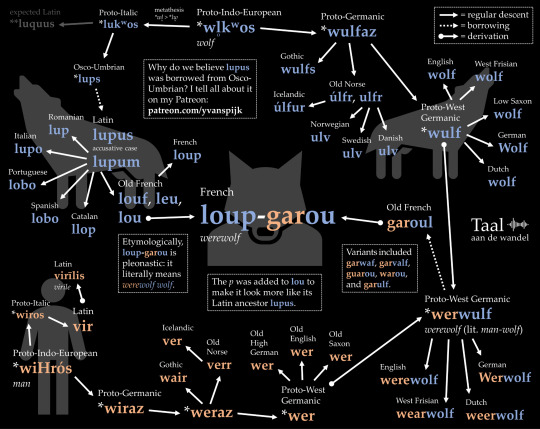
The French word for a werewolf is loup-garou. Etymologically, this compound is pleonastic: garou means 'werewolf' and loup means 'wolf'. It's also hybrid: loup stems from Latin lupus whereas garou was borrowed from West Germanic *werwulf. Click the image for more.
#historical linguistics#linguistics#language#etymology#english#latin#french#old french#proto-germanic#proto-indo-european#proto-italic#proto-west germanic#lingblr#werewolf#werewolves
988 notes
·
View notes
Note
Do you have any thoughts on the translation scene in Goncharov? I haven't seen a lot of people talking about it but it's a pretty pivotal scene and given that what they're doing is not dissimilar to a conlang imo i figured you might have some good insights
*sigh*
I figured someone was going to ask this eventually...
So listen, the whole translation scene in Goncharov is not technically conlang-related. It's actually even more brilliant, but it's hard to explain.
Since the tutor doesn't speak Russian and the nurse only speaks Italian, the aphasiac Soviet spy has to use an impromptu series of hand gestures to indicate that he either does or doesn't understand. I mean, you can glean that from the subtitles, so that's no big revelation.
But this is where it gets weird and...I mean, linguistically controversial, to say the least, but it was the 70s.
As the tutor and the nurse attempt to communicate with him and each other, they begin to winnow down their vocabulary to words that are cognate between Italian and Russian. And through this back and forth, the languages seem like they're blending, but what they're actually doing is reversing the sound changes of Italian and Russian until they both end up, improbably, at Proto-Indo-European. It's like something you'd see in Fantasia, but aural! It's...utterly bizarre.
And, of course the final word that the nurse and the tutor utter simultaneously, the one that brings the spy to tears, is *bʰewdʰ- "awake, aware"—which, I mean, knowing how the rest of the movie goes...yeah. Bombshell. And it's crazy to me that they didn't subtitle it! Like, you pretty much have to be a PIE scholar to get that, and the entire subplot hinges on it! I mean, bold isn't the word for it. Unfathomable. Cannot believe they got away with that...
Rumor has it that Morris Halle consulted on the film, but he's adamantly refused to talk about. (For years, he'd end all his guest lectures with, "Are they any questions about anything other than Goncharov?") He never once confirmed whether or not he was involved (of course, he wasn't credited, but that wouldn't be unusual for the time even if he was involved).
I can see why you'd think it would be a conlang, but the reverse-engineered sound changes were so precise, and the whole thing so by the book, that there really wasn't any actual invention. It was all Indo-European!
#goncharov#conlang#language#pie#indo-european#proto-indo-european#film#linguistics#morris halle#language evolution#historical linguistics
3K notes
·
View notes
Text
Oh well huh, speaking of substrates and Egyptian etc.: here's a brand new article proposing a former Afrasian branch in the Balkans, substratal to Proto-Indo-European
and yes this does at least sound like it would work better than trying to make PIE and PSem neighbors, or projecting binary Semitic–IE comparanda into Nostratic. TBD if anything more comes of this idea later on…
89 notes
·
View notes
Text
*gno-
*gnō-, Proto-Indo-European root meaning "to know."
It forms all or part of: acknowledge; acquaint; agnostic; anagnorisis; astrognosy; can (v.1) "have power to, be able;" cognition; cognizance; con (n.2) "study;" connoisseur; could; couth; cunning; diagnosis; ennoble; gnome; (n.2) "short, pithy statement of general truth;" gnomic; gnomon; gnosis; gnostic; Gnostic; ignoble; ignorant; ignore; incognito; ken (n.1) "cognizance, intellectual view;" kenning; kith; know; knowledge; narrate; narration; nobility; noble; notice; notify; notion; notorious; physiognomy; prognosis; quaint; recognize; reconnaissance; reconnoiter; uncouth; Zend.
It is the hypothetical source of/evidence for its existence is provided by: Sanskrit jna- "know;" Avestan zainti- "knowledge," Old Persian xšnasatiy "he shall know;" Old Church Slavonic znati "recognizes," Russian znat "to know;" Latin gnoscere "get to know," nobilis "known, famous, noble;" Greek gignōskein "to know," gnōtos "known," gnōsis "knowledge, inquiry;" Old Irish gnath "known;" German kennen "to know," Gothic kannjan "to make known."
—Etymonline
#etymology#knowing#knowledge#know#language#linguistics#Proto-Indo-European#Sanskrit#Persian#Latin#Greek#Irish#German#quote#gnosis
54 notes
·
View notes
Text
Words you didn’t know are related: gold, yellow, cholera, arsenic, yolk, and more!
The Proto-Indo-European language (the hypothesized original ancestor language of most modern languages in Europe and South Asia, hereafter abbreviated “PIE”) had a root *ǵʰelh₃- ‘yellow, green’.
Aside: How can this word refer to both ‘yellow’ and ‘green’? Historically, color terms in the world’s languages referred to a broader range of colors than they do today, and focused more on the texture…
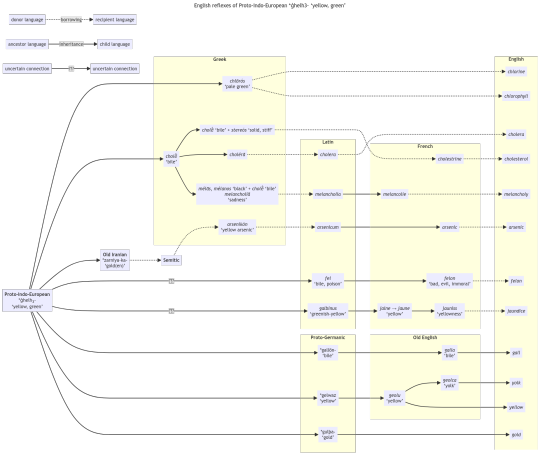
View On WordPress
#English#etymology#French#Greek#historical linguistics#historical reconstruction#Indo-European#Iranian#Latin#Latvian#Old English#Proto-Indo-European#Russian#Semitic#Slavic
46 notes
·
View notes
Text

#meme#memes#nerdy memes#programming#linguistics#lingblr#langblr#indo-european#proto-indo-european#historical linguistics#linguistics meme
12 notes
·
View notes
Text
youtube
Happy #PiDay! As has become traditional around here, we’re celebrating by sharing a video about our own particular brand of PIE!
#pi day#pi#pie#pie day#proto indo european#dictionary#dictionaries#proto-indo-european#unboxing#etymology#history#words#language#linguistics#word nerd#wordnerd#history of english#history of the english language#historical linguistics#lingcomm#lingblr#video#youtube
4 notes
·
View notes
Text
*Deh₂nu
*Deh₂nu- is a hypothetical goddess of water in Proto-Indo-European mythology, with connections to the names of rivers like the Danube, Don, Dnieper, and Dniester, as well as the Vedic deity Dānu, the Irish Danu, and the Welsh Dôn. Despite acknowledging a possible lexical connection, Mallory and Adams contend that there is not enough evidence to support the idea that a distinct river goddess existed in Proto-Indo-European beliefs. They primarily highlight the Indic tradition's understanding of river deification. Furthermore, Mallory and Adams suggest that a theory for a sea god called *Trih₂tōn—whose name is derived from the Greek Triton and the Old Irish word for sea, trïath—is unsupported by the lack of a corresponding sea god in Irish mythology and only minor lexical similarities. The Ossetian god Donbettyr is also mentioned in the story. Who is placated by gifts to keep the waterwheel turning, and who Donnán of Eigg proposes as a Christian equivilent of this figure.
Moreover, this deity and the Dan river in Centeral Asia may have similar etymologies.
She is frequently seen as the mother of a mythical tribe, the *Deh₂newyóes, in many Indo-European cultures; these tribes are deduced from the Vedic Danavas, the Irish Tuatha Dé Danann, the Greek Danaoi, and the Norse Danes. Under Bel's leadership, this tribe is said to have fought a hero called *H₂nḗrtos, which could connect them to characters like the Norse god Njord, the Nart from the Nart saga, and Indra's epithet nrtama.
#Irish#Vedic#Norse#Nart#Mallory#Irish Danu#Welsh Dôn#Irish mythology#hypothetical goddess#Proto-Indo-European#Welsh#Adams#Indic#Greek#Old Irish#Ossetian#Christian#Dan#Central Asia#Indo-European#Vedic Danavas#Tuatha Dé Danann#Danaoi#Bel#deity#sea#river#Norse Danes#tribe#druidicentropy
4 notes
·
View notes
Text
it’s interesting how the /w/ phoneme was so prominent in Proto-Indo-European and its descendant languages, but is actually pretty rare in modern Indo-European languages. or at least it’s rarer for /w/ to have remained /w/ (in other words, Spanish has a /w/ of sorts from sequences of u+vowel, like “huevo”, but the original Latin /w/ became /v/ and then /b/. like the v in huevo. lol).
English is like the only Germanic language that i can think of that kept it as-is. Dutch still distinguishes /w/ from the v that results from a voicing of /f/ in theory, but from what i understand, this isnt even true in every Dutch dialect lol. Romance languages only have /w/ when it comes from /ua/, /ue/, /uo/ etc, despite /w/ being so common in Latin. /v/ is a relatively uncommon sound cross-linguistically EXCEPT for languages that turned /w/ to /v/. /v/ almost always comes from /w/ or /f/ or /b/, and /f/ almost always comes from /p/, so like... idk, anyway i just think it’s interesting. /w/ is one of the most common sounds for a language to have, for a language to lose (by it either turning into v or disappearing completely like in Greek), AND for a language to gain (by lenition of other consonants, vowels in hiatus, etc). /j/ too, though that’s way more stable it seems. yes it does often change to other sounds, like how /j/ in Latin became three different sounds in French, Spanish, and Italian, but the entire Slavic branch kept /j/ pretty heavily. and both Slavic and Italic lost their original /w/s. Italic lost both the original /w/ and /j/ (for the most part, there are obviously exceptions, especially in smaller romance languages), but Slavic kept /j/, Germanic kept /j/ except for English (and probably some other smaller ones) who kept /j/ and /w/... etc.
interesting.
9 notes
·
View notes
Text
Dark the descent: the birds are golden-coloured; up to the heaven they fly robed in the waters. Again descend they from the seat of Order, and all the earth is moistened with their fatness. Twelve are the fellies, and the wheel is single; three are the naves. What man hath understood it? Therein are set together spokes three hundred and sixty, which in nowise can be loosened.
— Rig Veda 1.164.47-48
2 notes
·
View notes
Text
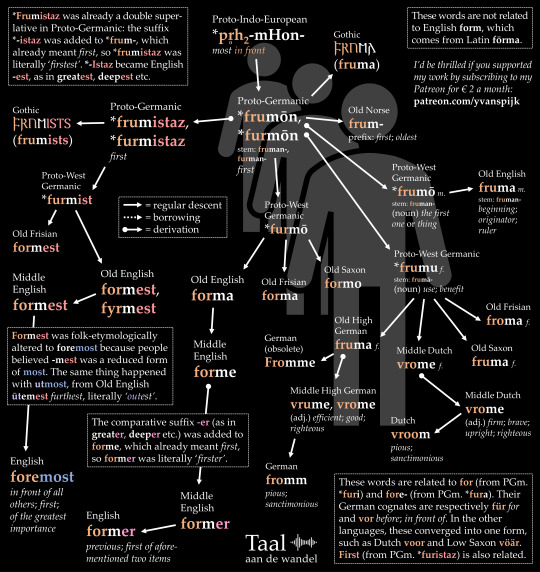
First, firster, firstest
Former was formed by combining Middle English forme ('first') and -er, so at the time it literally meant 'firster'. Foremost is peculiar too: it used to be formest - forme plus -est, so literally 'firstest' - but the part -mest was replaced by unrelated most. See the infographic for more.
#historical linguistics#linguistics#language#etymology#english#latin#dutch#german#proto-germanic#proto-west germanic#old saxon#old english#old high german#middle high german#middle dutch#gothic#proto-indo-european#old frisian#lingblr
97 notes
·
View notes
Text
The name of the Ouroboros, Easway's national symbol, in Ezerryen Easwegian is Hervicourei.
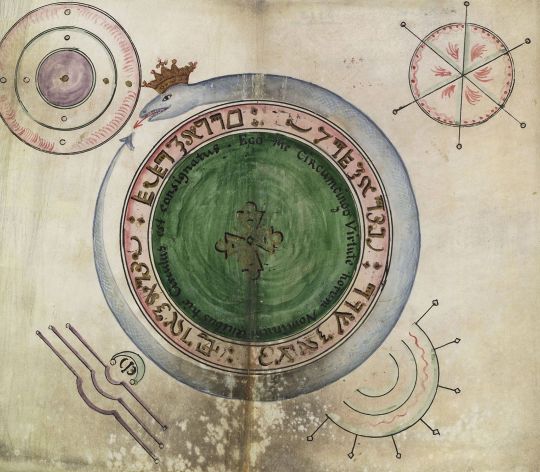
Hervi, meaning tail, comes from Proto-Indo-European *h₁ers- 'to flow.' and Ezerryen vi 'of.'
Courei, meaning biter, comes from Old Persian xwar 'to eat' and Ezerryen ei 'one who...'
2 notes
·
View notes
Text
Etymology of ‘adios’ and ‘adieu’
adios (interj.)
1837, American English, from Spanish adios, from phrase a dios vos acomiendo "I commend you to God;" the French form is adieu (q.v.).
adieu (interj.)
late 14c., adewe, from Old French a Dieu, a Deu, shortened from phrases such as a dieu (vous) commant "I commend (you) to God," from a "to" (see ad-) + dieu "God," from Latin deum, accusative of deus "god" (from PIE *deiwos "god" (from root *dyeu- "to shine").
Originally it was said to the party left (farewell was to the party setting forth), but in English it came to be used as a general parting salutation. As a noun, "expression of kind wishes upon departure," late 14c. Compare the native parting salutation good-bye, a contraction of God be with ye.
*dyeu-
Proto-Indo-European root meaning "to shine," in derivatives "sky, heaven, god."
It forms all or part of: adieu; adios; adjourn; Asmodeus; circadian; deific; deify; deism; deity; deodand; deus ex machina; deva; dial; diary; Diana; Dianthus; diet (n.2) "assembly;" Dioscuri; Dis; dismal; diurnal; diva; Dives; divine; joss; journal; journalist; journey; Jove; jovial; Julia; Julius; July; Jupiter; meridian; Midi; per diem; psychedelic; quotidian; sojourn; Tuesday; Zeus.
It is the hypothetical source of/evidence for its existence is provided by: Sanskrit deva "god" (literally "shining one"); diva "by day;" Avestan dava- "spirit, demon;" Greek delos "clear;" Latin dies "day," deus "god;" Welsh diw, Breton deiz "day;" Armenian tiw "day;" Lithuanian dievas "god," diena "day;" Old Church Slavonic dini, Polish dzień, Russian den "day;" Old Norse tivar "gods;" Old English Tig, genitive Tiwes, name of a god.
—Etymonline
#quote#language#linguistics#etymology#adios#adieu#good bye#God#theology#Spanish#French#Proto-Indo-European#light#shine
17 notes
·
View notes
Text
azure
During classical antiquity the semi-precious stone lapis lazuli was mined in a place called Lāžvard around modern Afghanistan. That’s also the name of the stone in Classical Persian (لاجورد). It comes from the Proto-Indo-European root *ǵʰelh₃- ‘to gleam, to shine’ + Proto-Iranian *varta- ‘stone’.
Other words that come from *ǵʰelh₃- include gold, yellow, felon, glow, and cholera!
Medieval Greek…
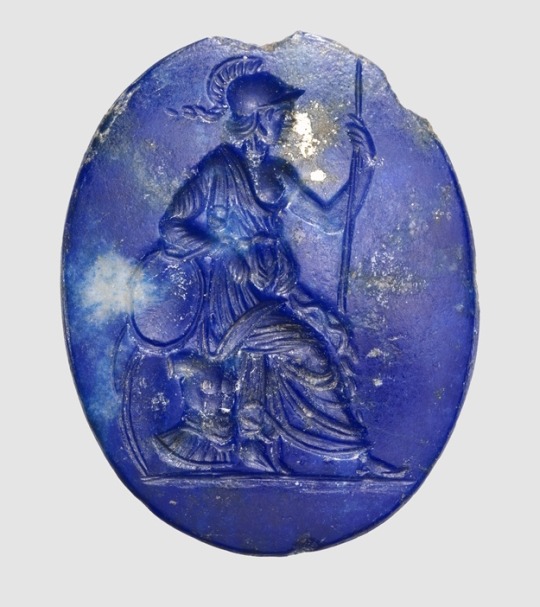
View On WordPress
30 notes
·
View notes
Text
The Spirit & The Moon: My journey thus far.
I began my spiritual journey years ago, in the same town where I was born after spending much of my childhood away. At first it was merely a quest for understanding, a journey into the cosmos to find peace with existence itself. In time the things which I wished to understand became so much larger than myself, I began to truly understand how infinite the cosmic forces and all their knowledge really were; and that they just like us had names.
My research began with the Spirit itself, the very thing that makes us mortals what we are, our will to fight and to survive, or to die in honour. During this period of my life I explored various different faiths and researched their ideologies and values as well as the roots of their spiritual beliefs, and it was during this time that the cosmic forces which shaped these various faiths became so apparent to me. This led me to my eventual faith as a Pagan, a worshipper of trees and stars, the old Gods, and the very Moon herself. As a Devotee of the Moon I continued my search for answers to the mysteries of the universe, under her light I sought the voice of the universe itself, and there I heard the sounds of ancient energies at work, the winds and the grass speaking to one another in a language long forgotten. The first tribes understood this language, and their children's children inherited this knowledge in repetition long after spreading across the land, spoken by those who would come to be known as the Norse and Gaels.
This language was once understood by tribes spanning the globe, from the East to the West stories have survived that carry its essence, the understanding of nature itself, however the earliest it was ever described in text was in the runes gifted to mankind by Odin, so the path of an Asatruar became clear to me. Having since learned of my Gaelic heritage my understanding thus far of what remains has only widened, and so I chose to begin writing a public journal in hopes of better cataloguing my research, and sharing what I've learned with those who are on similar paths to mine, however far along they may be in their journey.
There is much peace to be found in understanding, and though the universe may always keep its dearest secrets, it will whisper to those who listen.
#pagan#paganism#forn sidr#asatru#ancestry#heritage#history#lineage#spiritual journey#faith#spirituality#nature#naturalist#Norse#Normani#Gaelic#Galli#Germanic#Indo-European#Proto-Indo-European#religion
3 notes
·
View notes

